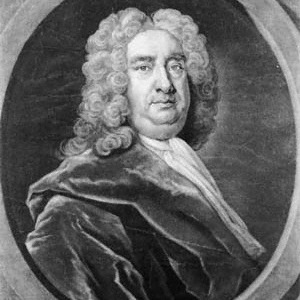- Surname:
- Cheyne
- First name:
- George
- Era:
- before 1700
18th century - Field of expertise:
- Medicine
Psychosomatics - Place of birth:
- Auchencreive, Methick, Aberdeens
- * 30.11.1672
- † 12.04.1743

Cheyne, George
Scottish 18th-century physician and philosopher.
George Cheyne (1672-1743) practised for many years as a doctor in the English spa town of Bath. He is considered a pioneer of vegetarianism and of modern concepts of “nervousness” and hypochondria.
Life
Cheyne was born into a wealthy family in Methlick, Aberdeenshire. He grew up in a privileged environment and enjoyed a liberal education. He studied medicine in Edinburgh and Aberdeen. In Edinburgh, he was strongly influenced by one of his teachers, the physician and poet Archibald Pitcairne (1652–1713). He graduated from the University of Aberdeen in 1701 and moved to London where he opened his own private practice in 1702. He became a member of the Royal Society and was acquainted with Isaac Newton and his circle. His debaucherous lifestyle eventually led to obesity; he weighed over “32 stones” (200 kg), was short of breath and became lethargic (Cheyne 1733: 342). In 1705, he experienced convulsive symptoms (“vertiginous paroxysms”), possibly signs of an impending stroke or heart attack. On a colleague’s advice, he consulted the physician Dr Taylor in Croydon, who recommended an austere diet (no meat, no alcohol, vegetarian food and dairy products; cf. Richardson 2013). Cheyne radically changed his lifestyle and dietary habits, and his weight and health normalised. In 1719, he transferred his practice to the spa town of Bath where he treated numerous prominent patients (e.g., David Hume, Alexander Pope). He suffered several severe relapses, particularly between 1723 and 1725, with attacks of fever and gout, ulcers, erysipelas and depressive moods. Yet, George Cheyne died without any serious bodily impediment at the age of 71 in Bath.
Dietary treatment and the cultural conditions of mental suffering
In 1725, Cheyne published his most successful and influential work, An Essay on Health and Long Life, in which he propagated the benefits of vegetarianism, the abstinence from alcohol, and physical exercise. His medical colleagues, particularly those in the Royal Society, were of divided opinion about the book. The critics accused Cheyne, who had been given the nickname “Dr Diet”, of putting medical matters that were the responsibility of doctors into the hands of patients.
His other famous work is The English Malady: or, A Treatise of Nervous Diseases of all Kinds, as Spleen, Vapours, Lowness of Spirits, Hypochondriacal and Hysterical Distempers, published in 1733. Cheyne claimed that the English people were particularly susceptible to nervous disorders, which he defined as follows: “Diseases are chiefly and properly called nervous whose symptoms imply that the system of the nerves and their fibres are evidently relax’d and broken” (1733: 14). According to him, the nervous system was made up from “hollow fibres packed into nerve tracts”, and the nervous symptoms resulted from blockages and plaques in these tracts, impairing their vigour and vibrancy and ultimately leading to lethargy, convulsions and disease. In order to revitalise the nerves, he recommended medication (e.g., bitter drinks, quicksilver, oils), a light diet and regular physical exercise (cf. Cheyne 1742: 57–133). He described the positive effect of this cure in the third part of The English Malady by presenting his own experiences on forty pages titled The Case of the Author (325–364).
George Cheyne theorised on diseases of affluence, attributing them to the increasing wealth and the idle life of the English bourgeoisie. His concepts on nerve physiology and the effects of milieu and lifestyle, including the recommended naturopathy cures, replaced the previous theological and humorism-based ideas regarding the nature and treatment of melancholia and hypochondria.
Literature
Cheyne, G. (1702): A New Theory of Acute and Slow Continu'd Fevers. 2nd Edition. Cornhill: Strahan.
Cheyne, G. (1705): Philosophical Principles of Natural Religion. Cornhill: Strahan.
Cheyne, G. (1715): Philosophical Principles of Religion. Natural and Revealed. In Two Parts. Cornhill: Strahan.
Cheyne, G. (1724): An Essay of Health and Long Life. Cornhill: Strahan.
Cheyne, G. (1733): The English Malady: or, A Treatise of Nervous Diseases of all Kinds, as Spleen, Vapours, Lowness of Spirits, Hypochondriacal and Hysterical Distempers. Cornhill, Bath: Strahan, Leake.
Cheyne, G. (1740): An Essay on Regimen, Together with Five Discourses, Medical, Moral, and Philosophical: Serving to Illustrate the Principles and Theory of Philosophical Medicine, And Point out Some of its Moral Consequences. Cornhill: Strahan.
Cheyne, G. (1742): The Natural Method of Cureing the Diseases of the Body and the Disorders of the Mind Depending on the Body. Cornhill: Strahan, Knapton.
Gerabek, W. E., B. D. Haage, G. Keil, W. Wegner (2004): Enzyklopädie Medizingeschichte. Berlin: de Gruyter.
Guerrini, A. (2000): Obesity and Depression in the Enlightenment. The Life and Times of George Cheyne. Norman: University of Oklahoma.
Ingram, A. (1998): Patterns of Madness in the Eighteenth Century. A Reader. Liverpool: Liverpool University Press, pp. 83–92.
Porter, R. (1995): Medicine in the Enlightenment. Amsterdam: Rodopi.
Richardson, S. (2013): Correspondence with Edward Cheyne and Thomas Edwards. Cambridge: Cambridge University Press.
Shuttleton, D. E. (1992): “My Own Crazy Carcase”. The Life and Works of Dr George Cheyne (1672–1743). Doctoral Thesis. University of Edinburgh.
Catharina Bonnemann, Burkhart Brückner
Picture: John Faber, Jr., 1732 / Source: Wikimedia / public domain.
Referencing format
Catharina Bonnemann, Burkhart Brückner (2015):
Cheyne, George.
In: Biographisches Archiv der Psychiatrie.
URL:
biapsy.de/index.php/en/9-biographien-a-z/314-cheyne-george-e
(retrieved on:24.07.2025)
